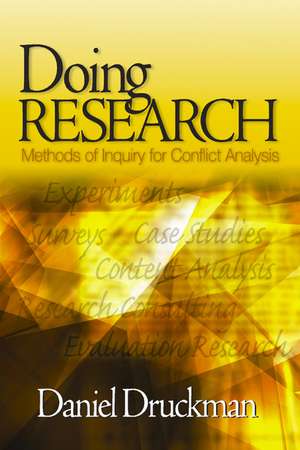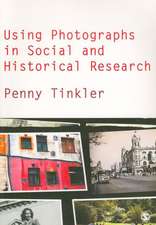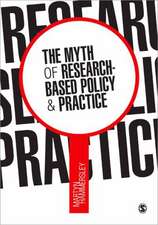Doing Research: Methods of Inquiry for Conflict Analysis
Autor Daniel Druckmanen Limba Engleză Paperback – 25 mai 2005
| Toate formatele și edițiile | Preț | Express |
|---|---|---|
| Paperback (1) | 833.93 lei 6-8 săpt. | |
| SAGE Publications – 25 mai 2005 | 833.93 lei 6-8 săpt. | |
| Hardback (1) | 1198.88 lei 6-8 săpt. | |
| SAGE Publications – 25 mai 2005 | 1198.88 lei 6-8 săpt. |
Preț: 833.93 lei
Preț vechi: 1142.37 lei
-27% Nou
Puncte Express: 1251
Preț estimativ în valută:
159.61€ • 172.29$ • 133.83£
159.61€ • 172.29$ • 133.83£
Carte tipărită la comandă
Livrare economică 18 aprilie-02 mai
Preluare comenzi: 021 569.72.76
Specificații
ISBN-13: 9780761927792
ISBN-10: 0761927794
Pagini: 408
Dimensiuni: 152 x 229 x 22 mm
Greutate: 0.54 kg
Ediția:First Edition
Editura: SAGE Publications
Colecția Sage Publications, Inc
Locul publicării:Thousand Oaks, United States
ISBN-10: 0761927794
Pagini: 408
Dimensiuni: 152 x 229 x 22 mm
Greutate: 0.54 kg
Ediția:First Edition
Editura: SAGE Publications
Colecția Sage Publications, Inc
Locul publicării:Thousand Oaks, United States
Recenzii
Doing Research is a gem. It provides multiple research methods and models focusing on conflict analysis and resolution that can be used by any student in a variety of social science disciplines or fields of study. I wish this book had been written 20 years ago.
Doing Research is the most widely acclaimed book on research methods for conflict resolution students to appear in recent years. The book makes a unique contribution to the conflict resolution field by providing a comprehensive overview of the cutting edge methodological approaches in the field. The book provides a wonderfully rich array of ideas about ways to do research for both the scholar and practitioner--pracademic--enriching the analysis and practice in the conflict resolution field. The author of a diverse intellectual background and experiences bases his contribution to the course on conflict analysis and resolution theory, and empirical evidence experience. He makes a highly valuable contribution to applying multi-methods to concrete examples from the conflict resolution field.
"Provides a valuable tool to those dealing with conflict analysis in a variety of disciplines and professions. The first of its kind, this book is expecially suited to conflict studies because Druckman demonstrates the value of multi-methods approches as a research program in a context 'moving vertically form small to large studies and moving horizontally from simulations to case studes'...Doing Research highlights just such complementarity and provides a 'foundation for the way methodologies can be used for social science research'."
Doing Research is the most widely acclaimed book on research methods for conflict resolution students to appear in recent years. The book makes a unique contribution to the conflict resolution field by providing a comprehensive overview of the cutting edge methodological approaches in the field. The book provides a wonderfully rich array of ideas about ways to do research for both the scholar and practitioner--pracademic--enriching the analysis and practice in the conflict resolution field. The author of a diverse intellectual background and experiences bases his contribution to the course on conflict analysis and resolution theory, and empirical evidence experience. He makes a highly valuable contribution to applying multi-methods to concrete examples from the conflict resolution field.
"Provides a valuable tool to those dealing with conflict analysis in a variety of disciplines and professions. The first of its kind, this book is expecially suited to conflict studies because Druckman demonstrates the value of multi-methods approches as a research program in a context 'moving vertically form small to large studies and moving horizontally from simulations to case studes'...Doing Research highlights just such complementarity and provides a 'foundation for the way methodologies can be used for social science research'."
Cuprins
Preface
Prologue
Doing Research on Conflict
Part Introduction
Why Do Research?
Research Foundations: Debating Points
Research Motivations, Assumptions, Questions
Some Contributions from Research on Conflict
Discussion Questions
Getting Started to Do Research
Where Ideas Come From
Choosing a Research Topic
Alternative Methodological Approaches
Choosing an Approach
Discussion Questions
Performing Experiments
Part Introduction
Designing Experiments and Conducting Simulations
The Experimental Method: An Overview
Internal and External Validity
Experimental Designs: Examples from CA&R
Summary
Discussion Questions
Evaluating Data from Experiments: Methods of Analysis
Essential Ideas of Statistical Analysis
Measurement and Statistical Power: Two-Group Designs
Measurement and Power: Three-Group Designs
Factorial Designs
Repeated Measures and Other ANOVA Designs
Summary
Discussion Questions
Designing and Conducting Surveys
Part Introduction
Survey Research
Overview
Survey Research Design
Measurement
Sampling
Data Collection
Ethics
Conclusions
Discussion Questions
Doing Case-Based Research
The Case-Study Method: An Overview
Enhanced-Case and Time Series Analyses
Theory and the Case Study
Time-Series Designs and Analyses
Systematic Expert Judgment
Qualitative Time-Series Analysis
Summary
Comparative Case Study Approaches
Focussed Case Comparisons
Aggregate Case Comparisons
Discussion Questions
Writing Ethnographies
Part Introduction
Ethnographic Methods
What is Ethnography?
Why do Ethnography?
The Logic of Ethnography
Making Sense of Other Worlds
Taking Notes
The Ethnographer's Tool Kit
Discussion Questions
Analyzing Documents: Texts and Process Analysis
Part Introduction
Content Analysis
Overview of the Approach
Technical Issues for the Content Analyst
Content Analysis Applications
Discussion Questions
Narrative Analysis
Overview of the Approach
Narrative Theory
Analysis of Narratives
Discussion Questions
Evaluating Interventions and Applying Research
Part Introduction
Evaluation Research
Challenges of Evaluation
Tasks in an Evaluation Project
Evaluation Issues
Evaluating Interventions: An Example of a Framework
Discussion Questions
Research for Action and Consulting
Basic and Applied Research
Action Research
Research Consulting
Discussion Questions
Concluding
Part Introduction
From Philosophies to Research Methods: The Value of Doing Research in Conflict Analysis and Resolution
Doing Research: Philosophies and Methodologies
Research Issues
Summary of Methods Covered
Comparing the Methodologies: Experiments, Surveys, and Case Studies
Types of Data
Wrapping Up
Epilogue
References
Prologue
Doing Research on Conflict
Part Introduction
Why Do Research?
Research Foundations: Debating Points
Research Motivations, Assumptions, Questions
Some Contributions from Research on Conflict
Discussion Questions
Getting Started to Do Research
Where Ideas Come From
Choosing a Research Topic
Alternative Methodological Approaches
Choosing an Approach
Discussion Questions
Performing Experiments
Part Introduction
Designing Experiments and Conducting Simulations
The Experimental Method: An Overview
Internal and External Validity
Experimental Designs: Examples from CA&R
Summary
Discussion Questions
Evaluating Data from Experiments: Methods of Analysis
Essential Ideas of Statistical Analysis
Measurement and Statistical Power: Two-Group Designs
Measurement and Power: Three-Group Designs
Factorial Designs
Repeated Measures and Other ANOVA Designs
Summary
Discussion Questions
Designing and Conducting Surveys
Part Introduction
Survey Research
Overview
Survey Research Design
Measurement
Sampling
Data Collection
Ethics
Conclusions
Discussion Questions
Doing Case-Based Research
The Case-Study Method: An Overview
Enhanced-Case and Time Series Analyses
Theory and the Case Study
Time-Series Designs and Analyses
Systematic Expert Judgment
Qualitative Time-Series Analysis
Summary
Comparative Case Study Approaches
Focussed Case Comparisons
Aggregate Case Comparisons
Discussion Questions
Writing Ethnographies
Part Introduction
Ethnographic Methods
What is Ethnography?
Why do Ethnography?
The Logic of Ethnography
Making Sense of Other Worlds
Taking Notes
The Ethnographer's Tool Kit
Discussion Questions
Analyzing Documents: Texts and Process Analysis
Part Introduction
Content Analysis
Overview of the Approach
Technical Issues for the Content Analyst
Content Analysis Applications
Discussion Questions
Narrative Analysis
Overview of the Approach
Narrative Theory
Analysis of Narratives
Discussion Questions
Evaluating Interventions and Applying Research
Part Introduction
Evaluation Research
Challenges of Evaluation
Tasks in an Evaluation Project
Evaluation Issues
Evaluating Interventions: An Example of a Framework
Discussion Questions
Research for Action and Consulting
Basic and Applied Research
Action Research
Research Consulting
Discussion Questions
Concluding
Part Introduction
From Philosophies to Research Methods: The Value of Doing Research in Conflict Analysis and Resolution
Doing Research: Philosophies and Methodologies
Research Issues
Summary of Methods Covered
Comparing the Methodologies: Experiments, Surveys, and Case Studies
Types of Data
Wrapping Up
Epilogue
References
Notă biografică
Daniel Druckman is a 2004-2005 visiting Professor at the University of Queensland¿s Australian Centre for Peace and Conflict Studies in Brisbane, Australia. He is the Vernon M. and Minnie I. Lynch Professor of Conflict Resolution at George Mason University in Fairfax, Virginia, where he has coordinated the doctoral program at the Institute for Conflict Analysis and Resolution (ICAR). He is also a member of the faculty at Sabanci University in Istanbul, Turkey and has held senior positions at several consulting firms, as well as at the U.S. National Academy of Sciences. He received a Ph.D. from Northwestern University and was awarded a best-in-field prize from the American Institutes for Research for his doctoral dissertation. He has published widely (approximately 150 publications, including 12 authored or edited books) on such topics as negotiating behavior, nationalism and group identity, human performance, peacekeeping, political stability, nonverbal communication, and methodology (including simulation). He serves as a board member or associate editor for eight Journals. He received the 1995 Otto Klineberg award for Intercultural and International Relations from the Society for the Psychological Analysis of Social Issues for his work on nationalism, a Teaching Excellence award in 1998 from George Mason University, and an award for the outstanding article published in 2001 from the International Association for Conflict Management. He is the recipient of the 2003 Lifetime Achievement award from the International Association for Conflict Management.
Descriere
An award-winning book, Doing Research is a must read. Designed for students across a variety of social science disciplines, it is the first research methods text devoted to conflict analysis and resolution. It begins with a discussion of the philosophical foundations for doing research, providing guidelines on how to develop research questions and how these questions can be addressed with various methodologies. The book presents a wide-ranging treatment of both quantitative and qualitative approaches to the design and analysis of problems of conflict.








